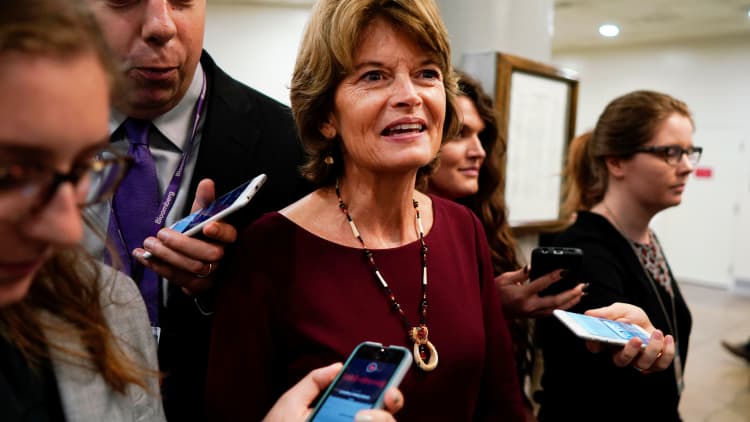WASHINGTON — Republican Sen. Lisa Murkowski announced Friday she will vote against admitting additional evidence in President Donald Trump's impeachment trial, a decision that apparently kills Democrats' hopes of winning over four Republicans and adding a witness phase to the trial.
"I worked for a fair, honest, and transparent process, modeled after the Clinton trial, to provide ample time for both sides to present their cases, ask thoughtful questions, and determine whether we need more," the Alaska senator said in a statement.

"The House chose to send articles of impeachment that are rushed and flawed. I carefully considered the need for additional witnesses and documents, to cure the shortcomings of its process, but ultimately decided that I will vote against considering motions to subpoena."
Within minutes of Murkowski's statement, another Republican senator, Rob Portman of Ohio, confirmed he will vote against admitting additional evidence. Portman had once been considered by Democrats to be a longshot possibility to break with his party and join them in voting yes.
"I do not believe that additional witnesses are needed," Portman said in a statement. "I believe that some of the president's actions in this case were wrong and inappropriate. But I do not believe that the president's actions rise to the level of removing a duly-elected president from office."
The expected Senate vote later in the day represents a pivotal moment in the proceedings that could pave the way for Trump's acquittal.
Democrats, led by Senate Minority Leader Chuck Schumer of New York and House impeachment manager Adam Schiff of California have battled to persuade the Republican-led chamber to vote to hear from key witnesses who did not testify in the House.
But after more than a week of trading barbs with Trump's defense team on the Senate floor, there doesn't appear to be any real chance that they will secure the 51 votes required to pass a rule that would introduce new witnesses and documents.
More than any other individual, Democrats had hoped they could persuade a few Republicans to seek the testimony of John Bolton, Trump's former national security advisor.
Bolton reportedly wrote in a manuscript of a memoir that Trump told him last summer he intended to withhold nearly $400 million in U.S. foreign aid to Ukraine until Kyiv agreed to announce investigations into the president's political opponents. The House voted to impeach Trump in December on two articles, abuse of power and obstruction of Congress, both stemming from Trump's handling of the U.S. relationship with Ukraine.
Democrats see Bolton as a crucial missing piece of the puzzle about what happened last year with Ukraine. Bolton has also said he would be willing to testify, something other officials, like acting White House Chief of Staff Mick Mulvaney, have not.
But a victory in Friday's vote appeared to slip away from Democrats with Murkowski's decision.
On Thursday, GOP Sen. Lamar Alexander of Tennessee, another Democratic target for a yes vote, said that although he believed the president had indeed solicited foreign assistance from Ukraine in his reelection bid, Trump's behavior did not meet the standard for impeachment. As such, Alexander said he didn't see the need for further evidence.
Only two Republican senators appear to be prepared to break with their party and vote with Democrats to admit more evidence: Susan Collins of Maine and Utah's Mitt Romney.
Republicans hold a 53-47 majority in the Senate, meaning at least four GOP senators would have had to buck their party leaders and vote for a resolution to admit additional witnesses and documents. A conviction and removal requires 67 votes.
This next phase of Trump's impeachment trial gets underway Friday with up to four hours of equally divided time allotted for senators to debate, before votes are called on amendments, including whether or not to subpoena witnesses and allow additional documents. Senators in each party are not required to use up their entire two hours, so the timing of Friday's votes will remain fluid throughout the afternoon.
Here's the text of Murkowski's statement:
"I worked for a fair, honest, and transparent process, modeled after the Clinton trial, to provide ample time for both sides to present their cases, ask thoughtful questions, and determine whether we need more.
"The House chose to send articles of impeachment that are rushed and flawed. I carefully considered the need for additional witnesses and documents, to cure the shortcomings of its process, but ultimately decided that I will vote against considering motions to subpoena.
"Given the partisan nature of this impeachment from the very beginning and throughout, I have come to the conclusion that there will be no fair trial in the Senate. I don't believe the continuation of this process will change anything. It is sad for me to admit that, as an institution, the Congress has failed.
"It has also become clear some of my colleagues intend to further politicize this process, and drag the Supreme Court into the fray, while attacking the Chief Justice. I will not stand for nor support that effort. We have already degraded this institution for partisan political benefit, and I will not enable those who wish to pull down another.
"We are sadly at a low point of division in this country."


